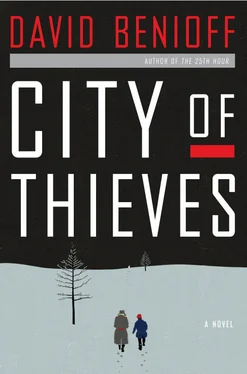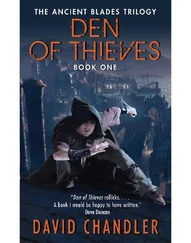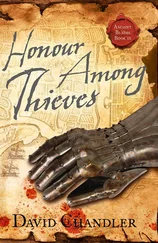Over the years I’ve played thousands of games against hundreds of opponents. I’ve played on a blanket in the Summer Gardens, in tournaments at the Palace of the Pioneers, in the courtyard of the Kirov with my father. When I played for the Spartak club, I kept records of all my games, but I threw them away when I quit competition. I was never going to study my old matches, not after I realized I was only a middling player. But if you gave me a piece of paper and a pen, even today, I could write out the algebraic notation of my entire game with Abendroth.
I sprang my queen from the back row on the sixth move, which seemed to surprise him. He frowned, scratching the stubble along his upper lip with his thumbnail. I chose the move because I thought it was a good one, but also because it might appear to be a bad one—neither of us yet had any sense of our opponent’s skill, and if he believed I was a poor player, I could lure him into committing a critical mistake.
He murmured something in German and moved his kingside knight, a reasonable response but not the one I had feared. If he had taken my pawn, he would have kept the initiative, forcing me to respond to his aggression. Instead he played defensively, and I took advantage by moving my bishop into his territory.
Abendroth leaned back in his chair, studying the board. After a minute’s worth of contemplation, he smiled and looked up at me.
“It has been a long time since I had a good game.”
I said nothing, watching the board, visualizing potential sequences of moves.
“You do not need to worry,” he continued. “Win or lose, you are safe. A good game every night will keep me sane.”
He sat forward again and moved his queen. While I deliberated, the young trooper returned carrying a slatted wood box stuffed with straw. Abendroth asked him a question and the trooper nodded, placing the box on the table.
“You’ve put me in the mood,” Abendroth said to Kolya. “If I win, I might eat a twelve-egg omelet.”
Kolya, sitting at the far end of the table, grinned at the sight of the box of eggs. Both troopers now stood behind him and Vika, their hands never straying from the butts of their submachine guns. Kolya had been trying to follow the game from a distance, but Vika stared at the table. Her face never gave much away, but I could tell she was irritated and I realized, far too late, that I had missed an opportunity. When the trooper had gone to fetch the eggs, we briefly outnumbered the Germans; they had guns and we had only knives, but it might have been our best chance.
Eight moves into the game the Sturmbannführer and I began exchanging pieces. I took a pawn; he took a knight. I took a bishop; he took a pawn. At the end of this flurry our forces were still evenly matched, but the board had opened up and I judged my position stronger.
“Violinists and chess players, eh?”
I had been afraid to look at him before, but now I stole a glance as he analyzed our formations. Sitting so close, I could see the dark, swollen crescents below his hazel eyes. His jaw line was strong and right-angled, in profile a capital L. He noticed that I was watching him and he raised his massive skull to stare back at me. I lowered my eyes quickly.
“Your race,” he said. “Despite everything, you make wonderful violinists and chess players.”
I pulled back my queen and for the next twelve moves we gathered our forces, avoiding direct confrontation. Both of us castled, protecting our kings as we prepared for the next battle, massing toward the center, trying to claim the best ground. On the twenty-first move I nearly fell for an elegant little trap he had set for me. I was ready to snatch an exposed pawn when I realized what the German had planned. I returned my bishop and moved my queen to give her a better angle of attack.
“Too bad,” said Abendroth. “That would have been a pretty little maneuver.”
I looked over and saw that Kolya and Vika were staring at me. The plan had never been spelled out, but now it seemed obvious. I wriggled my foot in my boot and felt the dead pilot’s sheath digging into my ankle. How quickly could I pull the blade? It didn’t seem possible that I could get the knife free and slash Abendroth’s throat before the troopers gunned me down. Even without his soldiers protecting him, Abendroth looked far too powerful for me to kill. When I was little, I had seen a strongman in a circus with hands like the Sturmbannführer’s—he had twisted a heavy steel wrench into a knot, and because it was my birthday, I got to keep it. For years I saved the knotted wrench, showed it to my friends in the Kirov, bragged about how the strongman had tousled my hair and winked at my mother. One day I looked for it and could not find it; I suspected Oleg Antokolsky stole it, but I never had any proof.
The idea of pulling a knife on a man that big panicked me, so I stopped thinking about it for a few minutes and concentrated on the game. A few moves later I saw an opportunity to exchange knights. My position seemed a little cramped, so I forced the trade. Abendroth sighed when he took my piece.
“I should not have allowed that.”
“Well played,” cried Kolya from the far end of the table. I turned that way, saw that he and Vika were still watching me, and quickly returned my focus to the board. How had I become the chosen assassin? Didn’t Kolya know me by now? Abendroth should die, I knew that—I had wanted him dead since I heard Zoya’s story. Without doubt he had slaughtered thousands of men, women, and children as he followed the Wehrmacht across Europe. Berlin awarded him shiny medals for executing the Jews, Communists, and partisans of occupied countries. He was my enemy. But facing him now across the chessboard, watching him worry his wedding ring as he contemplated his next move, I didn’t believe I was capable of murdering him.
The sheath dug into my ankle. The Sturmbannführer sat across from me, the collar of his jacket digging into a blue vein on the side of his broad neck. Kolya and Vika sat at the far end of the table, waiting for me to act. Given the weight of these distractions, I managed to play decent chess. As meaningless as the outcome might have been, the game mattered to me.
I sat with my elbow on the table, my head propped on my palm so that my hand blocked my view of Kolya and Vika. On the twenty-eighth move I pushed my c-pawn to the fifth row, an aggressive advance. Abendroth could take the piece with his b- or d-pawns. There is an old rule in chess that players should “capture toward the center.” Abendroth followed classical strategy, using his b-pawn, establishing dominance in the middle of the board. But just as Tarrasch said, “Always put the rook behind the pawns, except when it is incorrect to do so,” capturing toward the center is the right move except when it is wrong. When the sequence was over, we had exchanged two pawns each, our piece count was still even, and like a man who has swallowed poison but continues to chew his meat, not realizing his death is now certain, Abendroth had no idea he had committed a fatal error.
Far from tipping over his king, the German thought he held the superior position. As we neared the endgame, his a-pawn was alone on the edge of the board, racing toward the eighth row, where he could transform into a queen and batter my defenses. Abendroth was so intent on getting a second queen he gladly accepted the various exchanges I proposed. How could he lose with two queens on the attack? Focused on his a-pawn, he didn’t realize until too late that I had my own passed pawn in the center of the board. In the end, my d-pawn earned its promotion one move before his a-pawn. Two queens are tough to beat unless your opponent gets his second queen first.
Abendroth still did not realize the game was over, but it was over. I glanced at Vika, stupidly proud of my imminent victory, and saw that her hand had slipped inside her coveralls. She would wait no longer for me to act, she was reaching for her knife; and Kolya had his hands on the edge of the table, ready to shove himself to his feet and attack when she did. My eyes met Vika’s and I knew with sudden clarity that if I sat still, her tattered body would soon be dripping out its last on the peeling linoleum floor.
Читать дальше












